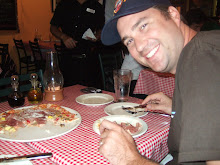The street home was amazing. Again, a large door was opened and our car went inside. From outside appearances, no one would know what was behind the gate. Inside, we were welcomed by timid children. They were slow to make eye contact. They were not generous with smiles. We waived and shook hands with the employees before being welcomed inside. The first room was a worship center. It was beautifully done with red curtains, wood benches, and a large cross. Jesus bumper stickers could be found here and there. They have service a few times a week in the hall and have devotionals daily.
I was then taken around the corner to the office. Fikadu is the director of all the homes and he was eager to welcome me in and have me sit before him. He took out the first folder. It contained the police report and care report for all the boys in care. Next was the girl's folder. Then was a folder of children that we would consider either adopted or in a long term foster care situation. Last was his accounting books. I never asked to see his accounting, but was glad he offered it because I knew that when asking for financial support for Hope for the Hopeless, people would want to know how we knew where it went and what accountability there was for it. Every donation or wire from the states corresponded with a receipt that was carbon copied. The receipt number would log into the book and into an asset entry column. All receipt numbers were accounted for. I was so impressed. It seemed so well organized.
I was taken into their storage area where bags of their grains were kept. I was given the cost and breakdown for the food the children would receive. Then I was shown the little closet where the food was prepared. It was mostly injera and breads that the children were fed. (I will go into diet more at the girls' home.) The next few rooms were crammed full of bunk beds. 14 beds in all. 2 of which were just recently emptied. It was an adequate facility, with a small driveway area for the children to play.
I was taken into their storage area where bags of their grains were kept. I was given the cost and breakdown for the food the children would receive. Then I was shown the little closet where the food was prepared. It was mostly injera and breads that the children were fed. (I will go into diet more at the girls' home.) The next few rooms were crammed full of bunk beds. 14 beds in all. 2 of which were just recently emptied. It was an adequate facility, with a small driveway area for the children to play.
So who were these kids and what were they doing here? The street home is a dropping center. The children are between the ages of 5 and 17 years old, normally in the middle of that range and the police have picked them up off of the street either committing crimes or begging. A police report is presented to Fikadu along with the child. The child is then taken for a medical screening. If the child tests positive to HIV, the child will go to another agency that specializes in care of HIV children and receive government funded medication. If not, the child will remain in the care of the street home for no more than 90 days. The goal of the street home is to find a family for the child to live with. Knowing that all children do best in families and deserve families, every effort is made to place this child with relatives if they can be found. If finances is the reason that the next closest relative can not care for them, they try to work with the family to help with food, clothes, medical care, and education for the child. This allows the extended family to not be burdened financially by the new member as well as ensures that the child's basic needs are met in a loving, family atmosphere. As long as the child is receiving food and care from Hope, the child is monitored to ensure that the family is treating them well and that the child is succeeding.
If no family can be found, the child will be transferred to the next available bed at either the boy home or the girl home. Because the child is not in the street home for more than 90 days, a private tutor is provided to help with reading and writing basics at the street home. A child with no permanent address can not be enrolled in school and this helps to ensure that any educational gap is kept to a minimum.
If no family can be found, the child will be transferred to the next available bed at either the boy home or the girl home. Because the child is not in the street home for more than 90 days, a private tutor is provided to help with reading and writing basics at the street home. A child with no permanent address can not be enrolled in school and this helps to ensure that any educational gap is kept to a minimum.
I was moved. Totally and completely impressed! This is a facility that is taking what society considers "the unadoptables" and is teaching them the truth of Jesus Christ as well as supporting the family structure whenever possible. This is a facility of hope for these children and when looking at the children, you can see that hope is something that many of them have never had.
By the time we were ready to leave and get to our embassy appointment, the children had come to smile and engage. They played some soccer and sang us a bible song. Their problems were gone for the moment and they were happy to pose for pictures. The children here had not been here as long as the children we had seen days prior at the "little kid orphanage". These children were older, street smart, and knew life was uncertain and cruel. They had no promise of being adopted by American parents- only the promise of Christ. My heart went out to each of them.
They hugged us goodbye and we promised to return the next day. They waived and smiled knowing that we brought good with us when we came and that tomorrow, more good would come. We left our first donation bag and drove away.
They hugged us goodbye and we promised to return the next day. They waived and smiled knowing that we brought good with us when we came and that tomorrow, more good would come. We left our first donation bag and drove away.









0 comments:
Post a Comment